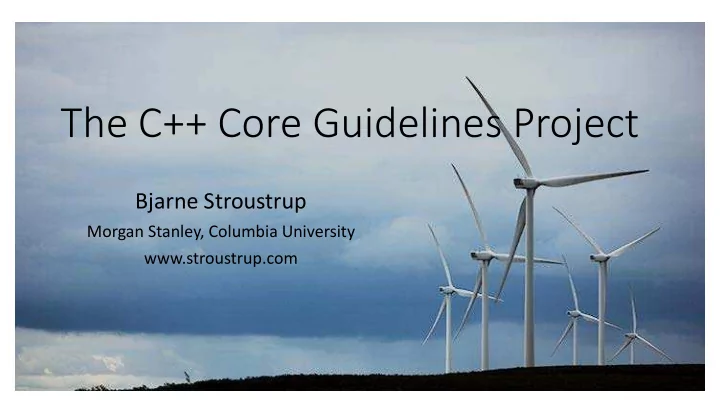

The C++ Core Guidelines Project Bjarne Stroustrup Morgan Stanley, Columbia University www.stroustrup.com
The big question • “What is good modern C++?” • Many people want to write ”Modern C++” • What would you like your code to look like in 5 years time? • “Just like what I write today” is a poor answer • The C++ Core Guidelines project • https://github.com/isocpp/CppCoreGuidelines • Produce a useful answer • Implies tool support and enforcement • Enable many people to use that answer • For most programmers, not just language experts • Please help C++ Core Guidelines - Stroustrup - OSSF'19 3
C++ Core Guidelines • We offer complete type- and resource-safety • No memory corruption • No resource leaks • No garbage collector (because there is no garbage to collect) • No runtime overheads (Except where you need range checks) • No new limits on expressibility • ISO C++ (no language extensions required) • Simpler code • Tool enforced • “C++ on steroids” Caveat: work in progress • Not some neutered subset C++ Core Guidelines - Stroustrup - OSSF'19 4
Work in progress • General approach • Guidelines • Library • Static analysis • Not all production ready • Some experimental • Some conjectures • Many parts in use • Not Science Fiction C++ Core Guidelines - Stroustrup - OSSF'19 5
Why not just “fix” C++? • C++ is too big and complicated • Obviously • With many features dating back to the 1970s and 1980s • Everybody wants “just two more features” • And not the same two features • Don’t break my code!!! • Nobody wants their code broken, however ugly • There are hundreds of billions of lines of C++ code “out there” • There are millions of C++ programmers • Stability/compatibility is a feature • We can’t simplify C++, but we can simplify the use of C++ C++ Core Guidelines - Stroustrup - OSSF'19 6
C++ use • About 4.5M C++ developers • 2007-17: increase of about 100,000 developers/year • www.stroustrup.com/applications.html C++ Core Guidelines - Stroustrup - OSSF'19 7
Why open source? • Some things are suspect unless done in public • We want everybody to benefit • We want everybody to be able to contribute • Initial contributors: Morgan Stanley, Microsoft, Red Hat, Facebook, CERN • 230 contributors so far C++ Core Guidelines - Stroustrup - OSSF'19 8
Taste • A crowd doesn’t have taste • People with taste don’t have the same tastes • How to maintain coherence, integrity of design? • Articulate design principles • Have a stable team of gatekeepers C++ Core Guidelines - Stroustrup - OSSF'19 9
Guidelines: High-level rules • Provide a conceptual framework • Primarily for humans • Many can’t be checked completely or consistently • P.1: Express ideas directly in code • P.2: Write in ISO Standard C++ • P.3: Express intent • P.4: Ideally, a program should be statically type safe • P.5: Prefer compile-time checking to run-time checking • P.6: What cannot be checked at compile time should be checkable at run time • P.7: Catch run-time errors early • P.8: Don't leak any resource • P.9: Don't waste time or space C++ Core Guidelines - Stroustrup - OSSF'19 10
Guidelines: Lower-level rules • Provide enforcement • Some complete • Some heuristics • Often easy to check “mechanically” • Primarily for tools • To allow specific feedback to programmer • Help to unify style • R.1: Manage resources automatically using resource handles and RAII • R.2: In interfaces, use raw pointers to denote individual objects (only) • R.3: A raw pointer (a T*) is non-owning • R.4: A raw reference (a T&) is non-owning • R.5: Prefer scoped objects, don't heap-allocate unnecessarily • R.6: Avoid non-const global variables • Not minimal or orthogonal C++ Core Guidelines - Stroustrup - OSSF'19 11
Static analyzer (currently integrated) C++ Core Guidelines - Stroustrup - OSSF'19 12
GSL – Guidelines support Library • Minimal, to be absorbed into ISO C++ • not_null , owner , Expects , Ensures , … • span • Non-owning potentially run-time checked reference to a continuous sequence • Implemented as a pointer, integer pair int a[100]; span s {a}; // note: template argument deduction for (auto x : s) // note: no range error, not nullptr check cout << x << '\n'; Elements size C++ Core Guidelines - Stroustrup - OSSF'19 13
Overview • Maintain static type safety • Avoid cast and un-tagged unions • Be precise about ownership • Don’t litter • Use ownership abstractions • Eliminate dangling pointers • Make general resource management implicit • Hide every explicit delete/destroy/close/release • “lots of explicit annotations” doesn’t scale • Static guarantees (run-time is too late) • Test for nullptr and range • Minimize run-time checking • Use checked library types C++ Core Guidelines - Stroustrup - OSSF'19 14
Recommend
More recommend